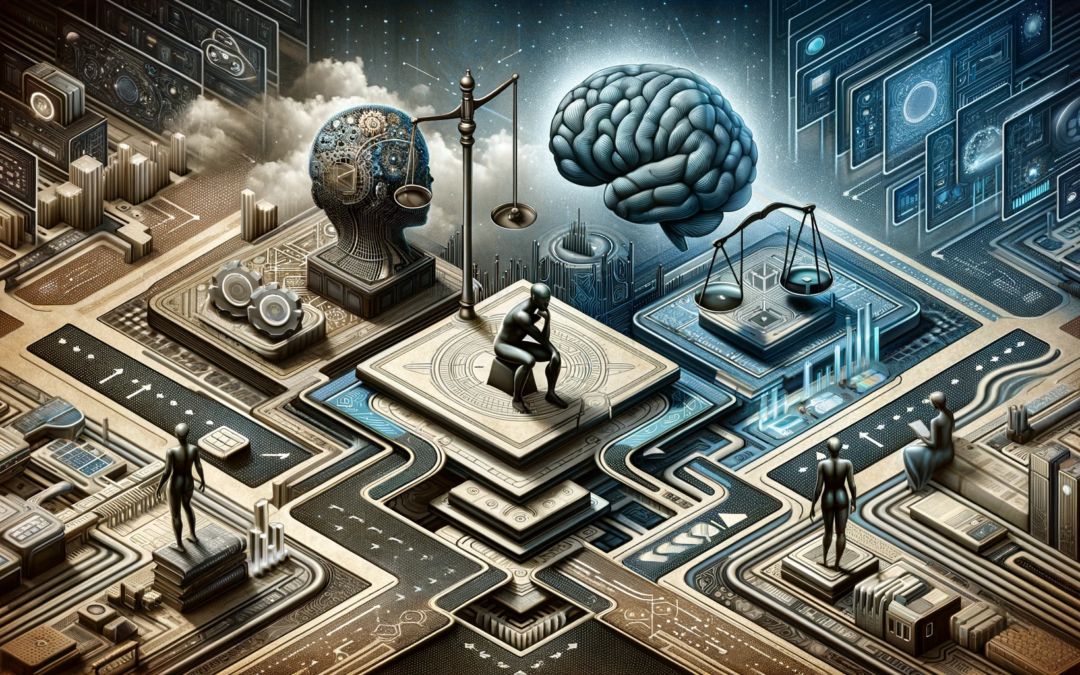AI and Ethics: Navigating Decision-Making in Business and Governance
In today’s fast-paced, information-rich world, decision-making has become increasingly complex. As businesses and governments grapple with the challenges of navigating this complexity, the rise of AI offers both opportunities and ethical dilemmas. In this blog post, we will explore how AI is not only aiding in decision-making processes but also raising important questions about ethics, transparency, and the role of AI in shaping policy and business practices.
AI in Business Decision-Making
AI is revolutionizing the way businesses make decisions. From market analysis to operational decisions and risk management, AI is being used to inform and enhance business strategies. Companies that have successfully integrated AI into their decision-making processes, such as Amazon and Netflix, have seen significant improvements in efficiency and profitability.
AI in Policy and Governance
The impact of AI is not limited to the business world. In governance, AI is being used to shape policy, enhance public services, and address societal challenges. For example, AI-driven governance has led to innovative solutions in areas like healthcare, transportation, and urban planning. The ability of AI to process vast amounts of data and generate insights is transforming the way governments make decisions and deliver services to their citizens.
Ethical Considerations and Transparency
While AI offers tremendous potential, it also raises important ethical considerations. Bias, accountability, and the transparency of AI algorithms are just a few of the ethical challenges that need to be addressed. For instance, AI algorithms can inadvertently perpetuate biases present in the data they are trained on, leading to discriminatory outcomes. Ensuring ethical use of AI in business and governance requires careful consideration and oversight.
Balancing AI and Human Judgment
As AI becomes more advanced, it is crucial to strike a balance between AI-driven recommendations and human judgment. While AI can provide valuable insights and augment decision-making processes, human oversight is essential to ensure that decisions align with ethical standards and values. The ideal relationship between AI and human decision-makers is one where AI serves as a trusted tool, empowering humans to make informed and ethical choices.
The Future of AI in Decision-Making
The future holds exciting possibilities for AI in decision-making. Advancements in AI technology will continue to shape how decisions are made across various sectors. However, it is important to consider the long-term implications of relying on AI for critical decisions. Questions about the accountability of AI, the potential for job displacement, and the impact on human creativity and intuition need to be explored and addressed.
Engaging with the Audience
We invite you, our readers, to share your thoughts and experiences with AI in decision-making, particularly in business or governance contexts. We encourage discussions about the potential benefits and challenges of AI-assisted decision-making. Let’s collectively explore the ethical and practical dimensions of AI and its impact on decision-making.
Conclusion
AI has the potential to enhance decision-making in business and governance. However, it is crucial to approach AI with a strong ethical framework and ensure transparency and accountability. Ongoing dialogue and research on the intersection of AI, ethics, and decision-making are essential to navigate the complexities of this emerging field. Let us embrace the opportunities AI presents while upholding our values and ensuring a human-centric approach to decision-making.










